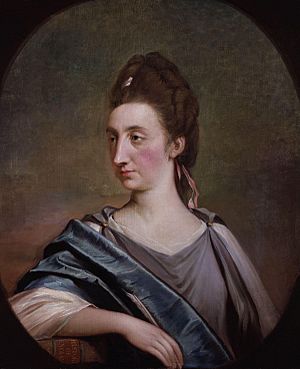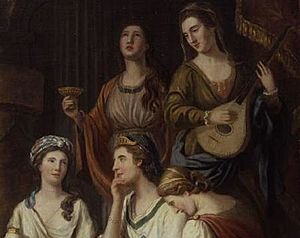Catharine Macaulay facts for kids
Quick facts for kids
Catharine Macaulay
|
|
|---|---|

Portrait of Catharine Macaulay by Robert Edge Pine, c. 1785.
|
|
| Born |
Catharine Sawbridge
23 March 1731 Olantigh, Wye, Kent, England
|
| Died | 22 June 1791 (aged 60) Binfield, Berkshire, England
|
| Resting place | All Saints' Church, Binfield |
| Nationality | English |
| Occupation | Historian, author |
| Known for | Writing on the history of England, political activism |
|
Notable work
|
The History of England from the Accession of James I to that of the Brunswick Line (1763–1783) |
| Spouse(s) |
|
| Parent(s) |
|
Catharine Macaulay was an English historian and writer. She was born Catharine Sawbridge and later became Catharine Graham. She lived from 1731 to 1791. She was known for her strong beliefs in liberty and for writing a famous history book about England.
Contents
Early Life and Education
Catharine Macaulay was born in 1731 in Kent, England. Her father, John Sawbridge, owned land. Catharine was educated at home by a governess.
She later said that from a young age, she loved reading history books. She especially liked stories about ancient Rome and Greece. These books taught her about freedom and liberty, which became very important to her.
However, she also told friends that she was a "thoughtless girl" until she was 20. She said she only started loving books after picking up a history book at her father's house. She also mentioned that she did not know Latin or Greek.
In 1760, Catharine married Dr. George Macaulay, a Scottish doctor. They lived in London and had one child, Catharine Sophia. Dr. Macaulay died in 1766.
Writing The History of England
Between 1763 and 1783, Catharine Macaulay wrote an eight-volume book called The History of England. When she started, she planned to cover history up to 1714. But she realized she wouldn't reach that year. So, she changed the title to The History of England from the Accession of James I to the Revolution.
Before this book, Catharine was not well-known. But after the first volume came out, she became famous. She was the first Englishwoman to become a historian. During her lifetime, she was the only female historian in the world.
What Her History Book Was About
Her History focused on the 1600s in England. She wanted to honor the people who fought for freedom during that time. She felt that many people had forgotten how important liberty was.
Macaulay believed that the early English people, the Anglo-Saxons, had freedom and equality. But she thought they lost these rights after the Norman Conquest. For her, English history was a fight to win back these lost rights.
She saw the time when England was a republic (the Commonwealth of England) as a "brightest age." She praised the Long Parliament as a very patriotic government. She also admired the Parliamentarian army, saying they fought for their beliefs.
Macaulay believed that kings who became tyrants lost their right to rule. She supported the execution of King Charles I. She argued that people could remove kings and choose better governments.
However, she was very critical of Oliver Cromwell. She called him a "vain-glorious usurper." She felt he ended a time of great national glory for England.
She also had mixed feelings about the Glorious Revolution of 1688. She liked that it limited the king's power. But she felt that leaders missed a chance to take away more power from the crown.
Macaulay was also against Catholicism. She believed that Catholics wanted to bring England back under the control of the Church of Rome. She thought their beliefs supported absolute power, which was against a free government.
Throughout her book, Macaulay focused on the moral character of leaders. She thought that acting for personal gain, instead of for liberty, was the worst fault. She believed that only good people could create a republic.
How People Reacted to Her Book
At first, many Whigs liked her book. They saw it as a Whig answer to David Hume's "Tory" history. But in 1768, things changed. When volume four came out, Macaulay praised the execution of King Charles I. She also showed her support for a republic. This made many Whigs stop supporting her.
Still, many important people admired her work. Thomas Hollis said her history was "honestly written" and full of "noblest sentiments of Liberty." Horace Walpole called it "the most sensible...history of England." William Pitt praised her in Parliament.
By 1770, Macaulay was very famous. Her portraits were everywhere, and she was seen as a "prodigy." But her fame ended in 1778 when she remarried. Many of her friends and supporters left her. She then became less known to the public.
Political Views
Macaulay was involved with political groups in the 1760s and 1770s. She supported the American Revolutionaries and wanted to reform the British Parliament. She was a strong supporter of John Wilkes, a radical politician.
She believed in political equality but not necessarily in equal wealth. She said she was not "arguing against that inequality of property which must more or less take place in all societies."
She also supported Pasquale Paoli, a leader from Corsica. She wrote about a democratic government with two parts: a Senate and the People. She believed the people should have enough power to be part of the government. She also thought public offices should change regularly to prevent corruption.
Macaulay disagreed strongly with Edmund Burke, another famous writer. She criticized his ideas about government. She believed that corruption in Parliament came from the Glorious Revolution. She wanted a system where Members of Parliament (MPs) changed often. She also wanted more people to have the right to vote.
Interestingly, Macaulay's writings did not focus on women's rights. She did not suggest that women should be able to vote.
In 1774, she visited France. When asked if she wanted to see the Palace of Versailles, she said no. She explained that she had no desire to see the home of tyrants.
Her last work was a response to Burke's book about the French Revolution. She argued that the French were right to seek liberty. She believed that rights should be seen as natural rights, not gifts from kings. She also felt that the "birthright of an Englishman" was arrogant. She thought it suggested that others did not deserve the same freedoms.
Later Life and Writings
On November 14, 1778, Catharine Macaulay married William Graham. She was 47, and he was 21. This marriage was seen as scandalous at the time. It further damaged her reputation in Britain. She then lived in Bath and later in Binfield, Berkshire.
Treatise on the Immutability of Moral Truth
Catharine was a lifelong member of the Church of England. In her book Treatise on the Immutability of Moral Truth, she wrote about God's power and goodness. She believed that people could improve themselves and society. She also thought that reason alone was not enough. She felt the Church should focus on practical Christian teachings. She rejected the idea that human nature was fixed. She wrote, "There is not a virtue or a vice that belongs to humanity, which we do not make ourselves."
She also believed in an afterlife. When she was very ill in 1777, she said that death did not scare her. She saw it as a short break before reuniting with friends in a better state.
Letters on Education
In her 1790 book, Letters on Education, Catharine Macaulay wrote about women's education. Like Mary Wollstonecraft did later, Macaulay argued that women seemed weaker because they were not educated properly.
Visit to America
Catharine Macaulay knew many leaders of the American Revolution. She was the first English radical to visit America after it became independent. She stayed there from July 1784 to July 1785.
She visited James Otis, Jr. and his sister, Mercy Otis Warren. Mercy described Macaulay as a woman with "almost inexhaustible" knowledge and a "Commanding Genius." She felt Macaulay had a deep influence on her.
Macaulay also visited George Washington and his family at Mount Vernon. Washington later wrote that he was pleased to meet "a Lady...whose principles are so much and so justly admired by the friends of liberty and mankind."
Last Years
Catharine Macaulay had planned to write a history of the American Revolution. However, her health declined, and she could not complete it. She wrote to Mercy Otis Warren in 1787 that she would have loved to write it if she were younger.
Catharine Macaulay died in Binfield, Berkshire, on June 22, 1791. She was buried in the local church there.
Works
- The History of England from the Accession of James I to that of the Brunswick Line:
- Volume I (1763).
- Volume II (1765).
- Volume III (1767).
- Volume IV (1768).
- Volume V (1771).
- Volume VI (1781).
- Volume VII (1781).
- Volume VIII (1783).
- Loose Remarks on Certain Positions to be found in Mr. Hobbes's 'Philosophical Rudiments of Government and Society', with a Short Sketch of a Democratical Form of Government, In a Letter to Signor Paoli (1767).
- Observations on a Pamphlet entitled 'Thoughts on the Cause of the Present Discontents' (1770).
- An Address to the People of England, Scotland and Ireland on the Present Important Crisis of Affairs (1775).
- The History of England from the Revolution to the Present Time in a Series of Letters to a Friend. Volume I (1778).
- Treatise on the Immutability of Moral Truth (1783).
- Letters on Education with Observations on Religions and Metaphysical Subjects (1790).
- Observations on the Reflections of the Rt. Hon. Edmund Burke, on the Revolution in France (1790).
See also
 In Spanish: Catharine Macaulay para niños
In Spanish: Catharine Macaulay para niños
 | Tommie Smith |
 | Simone Manuel |
 | Shani Davis |
 | Simone Biles |
 | Alice Coachman |


